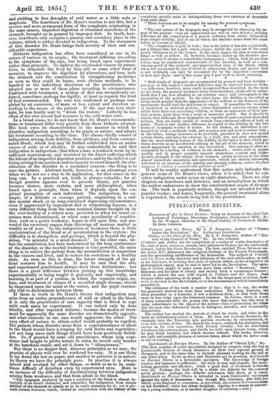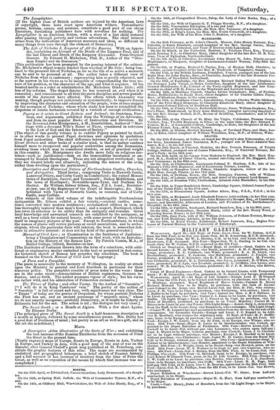PUBLICATIONS RECEIVED.
BOOM
Treasures of Art in Great Britain : being an Account of the chief Col- lections of Paintings, Drawings, Sculptures, Illuminated MSS., &c. By Dr. Waagen, Director of the Royal Gallery of Pictures at Berlin. In three volumes.
Voltaire and his Times. By L. F. Bungener, Author of "France before the Revolution," &c. Authorized translation. Julian, or the Close of an ,Era. By L. F. Bungener, Author of "His- tory of the Council of Trent," &o. In two volumes. [Voltaire and Julian are the completion of a series of works descriptive of the state of men, manners, morals, and opinions in France, for the eighteenth century, before the Great Revolution. The first, entitled Three Sermons un- der Louis .X V, delineated the religious feelings of the French Protestants, and the persecuting indifference of the Romanists. The subject of Voltaire and his Times is the character and influence of the arch-philosopher, as well as his followers, in forming that state of opinion which, so far as regarded its philosophical aspect, may be said to have led to the Revolution. The open- ing of Julian might in some sense have been called " Rousseau," since Rousseau and his ideas of liberty and society form a conspicuous feature ; which is indeed the case with regard to Voltaire and his Times, Jean Jacques often appearing in its pages. By, far the larger part of Julian, how- ever, is devoted to the Revolution, or to the circumstances which immediately preceded it. The substance of the work is matter of fact ; that is to say, the writer has generally derived his facts from authorities. The facts, however, are
often presented in a dramatic if not a fictitious form ; so that both books
more or less verge upon the historical romance. In Julian, there is a sort of story connected with the person who bears that name; but this story is quite subordinate to the object of the author—that of presenting the times and the men who influenced them, in dialogues, sketches, and occasionally disquisition. The author has studied the periods of which he treats, and takes in the main an oldfashioned notice of them. He does not overrate Rousseau, for example, turn the Terrorists into patriots overborne by circumstances, er even into victims of fate. He depicts his scenes, conducts his dialogues, and carries on his own exposition, with French vivacity ; but he sometimes wiredraws his conversations, and dwells too fully upon minute traits, which he may think truthful, but which become tedious. The books, however, are light and readable pictures of curious times, about which we never seem to tire of reading.] Quicksands on Foreign Shores. By the Author of "Social Life," &c. [The first number of a new speculation designed to compete with the bad or questionable fictions of cheap literature on their own especial ground of cheapness, and at the same time to furnish pleasant reading for the rail or any other place. So far as story and literature are in question, Quicksand* on Foreign Shores is a favourable specimen. The knowledge of foreign
scenery and manners is sufficient ; the style is easy and elegant, the story- telling agreeable and effective; while a good deal of freshness is thrown over all. Perhaps the book will be a shade too didactic for the common
novel glutton ; perhaps the didactic conclusion falls short, as is usual. Quicksands on Foreign Shores is intended to warn Continental sojourners against the wiles of Romanisai : but, though Mrs. Courtney, wise with her family quits England to economize, is perverted, she returns to Protestantism on her deathbed ; while her eldest daughter, Agatha, ie a means sf convert- ing a young nobleman, as is another daughter of releasing a nun.]
The Lamplighter.
[If the higher class of British authors are injured by the American laws of copyright, those laws react upon American writers. Transatlantic poems, fictions, essays, and sermons, constitute a good past of our cheap literature, furnishing publishers here with novelties for nothing. The Lamplighter is an American fiction, with a story of a lost child restored after passing through poverty and various adventures. The chief interest arises from the indications of American manners and ideas, so different in many things from ours through the element of Democracy.]
The Life of Nicholas I, Emperor of All the .Russias. With an Appen- dix, containing an Account of the Death of the Emperor Paul, and of the last Illness and Death of the Emperor Alexander. From Original Sources. By Edward H. Michelsen, Phil. D., Author of the "Otto- man Empire and its Resources."
phis publication has been prompted by the passing interest of the subject. Mr. Miohelsen's object is more limited than was that of Mr. Cole ; being con- fined to the personal life of Nicholas, so far as the life of so active a monarch can be said to be personal at all. The author takes a different view of Nicholas from what is customary ; representing him as poorly educated, and so far narrow in his views as to be incapable of comprehending the true na- ture of his position, or the character of the age, and what it requires. Of his boasted merits as a ruler or administrator Mr. Michelsen thinks little ; still lees of his reforms. The despot fancies he has removed an evil when it is concealed ; and concealment is all that the stern discipline and severe punish- ments of the Autocrat have effected. The efforts which Alexander was making, though perhaps not judiciously or systematically, to improve Russia by improving the character and education of the people, were at once stopped on the accession of Nicholas ; whose whole study has been to reestablish the despotism of Asiatic barbarism covered by a varnish of corrupt civilization.]
Popery as it exists in Great Britain and Ireland; its Doctrines, Prac- tices, and Arguments, exhibited from the Writings of its Advocates, and from its most popular Books of Instruction and Devotion. By the Reverend John Montgomery, A.M., Innerleithen, Author of "Mar- riage with a deceased Wife's Sister or Niece, considered in reference to the Law of God and the Interests of Society."
[The object of this goodly volume is to exhibit Popery as painted by itself, or in other words to present Papal doctrines and opinions by quotations from Papal authorities. The chief difference between Popery as it exists in Great Britain and other books of a similar kind, is that its author confines himself more to recognized and popular authorities among the Romanists, avoiding those which may be considered obsolete, or not of practical weight in this country. Mr. Montgomery also dwells more fully. on religious doc- trines—such as justification—than on the immoralities inculcated or en- couraged by Romish theologians. These are not altogether overlooked ; but they are treated briefly and allusively, indicating the nature of the evils, rather than dwelling upon the particulars.]
Descriptive and Historical Notices of Northumbrian Castles, Churches, and Antiquities. Third Series ; comprising Visits to Naworth Castle, Lanercost Priory, and Corby Castle in Cumberland ; the ruined Monas- teries of Bunkburn, Jarrow, and Tynemouth ; Bishop Middleham, and the town of Hartlepool ; Newcastle-upon-Tyne, and Durham Ca- thedral. By William Sidney Gibson, Esq., F.S.A. Lond., Barrister- at-law, one of the Registrars of the Court of Bankruptcy, &e. Em- bellished with Views of Naworth Castle, as restored, and of Corby Castle, near Carlisle. [The subjects of this third volume of the indefatigable Northumbrian antiquarian Mr. Gibson exhibit a fair variety,—ancient castles, some- times converted into modern residences ; ecclesiastical edifices in ruin, or less thoroughly restored than man's house ; and a seaport, Hartlepool, which less owes its selection to its utility than its antiquity and remains. Great local knowledge and unwearied research are exhibited by the antiquary, as well as a keen relish for natural beauty, with some power of fancy, showing itself in imaginary pictures of the past. Except to Northumbrians, in whom the names of places will revive pictures or recall associations, and to archae- ologists, whom the particular facts will interest, the book is somewhat defi- cient in attractive interest : it does not lay hold of the general reader.] Manual of Civil Law; or Examination in the Institutes of Justinian : being a Translation and Commentary on that work, with an Introduc- tion on the History of the Roman Law. By Patrick Cumin, M.A., of Balliol College, Oxford, Barrister-at-law. Lille Institutes of Justinian thrown into the form of a catechism, with addi- tional or explanatory matter embodied in the text or presented in foot-notes. An historical sketch of Roman law precedes the catechism. The book is founded on the French Afanual of Civil Law by Lagrange.] A Poem and a Pamphlet. [The poem is nominally to the memory of Wellington, in reality an attack upon the Ministry in general and Lord Aberdeen in particular for their timorous policy. The pamphlet consists of prose notes to the verse : these are in the same strain—denunciations of British supineness, German in- fluence, and so forth. The author possesses vigour of style ; but his views are rather wild, and his admiration of Palmerston excessive.]
The Titans of Today ; and other Poems. By the Author of "Sesostris." [" I will do it in King Cambyses' vein." The poetry of the author of " Sesostris " is full of sound and fury, with significance not very clear. The " Titans " of today are the genius of Despotism, for whose portrait Nicholas the First has sat, and an ancient personage of " majestic mien," whom we do not exactly recognize—probably Democracy, or it might be Liberty or Britannia but for the sex. The action is nil ; the dialogue not very clear.]
The Sweet South ; or a Month at Algiers. With a few short Lyrics.
By Eleanor Darby.
[The principal piece of The Sweet South is a half-humorous description of a month at Algiers, followed by some miscellaneous poems. Mrs. Darby has a good deal of liveliness of mind ; but poetry is an art as well as a gift, and in the art she is deficient.] A Descriptive Atlas illustrative of the Seats of War; and exhibiting the vast increase of the Russian Territories from the accession of Peter the Great to the present time.
[Neatly engraved maps of Europe, Russia in Europe, Russia in Asia, Turkey in Europe, and Turkey in Asia, with a good map of the seat of war on the Danube, after General Chaloff's great map published at St. Peterburg, con- stitute the graphic features of this atlas. The maps are accompanied by statistical and geographical letterpress, a brief sketch of Russian history, and a full account of her increase of territory from the time of Peter the Great, as well as an exposition of the means by which that increase was ac- complished.]



























 Previous page
Previous page